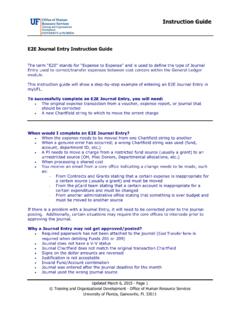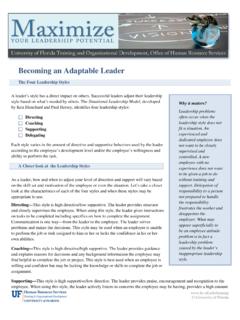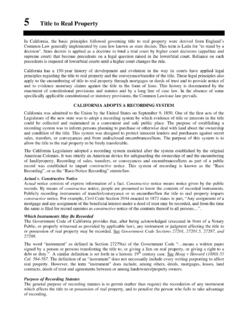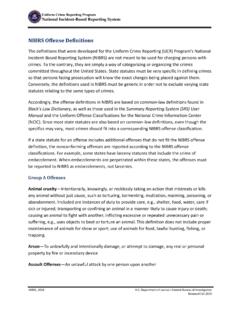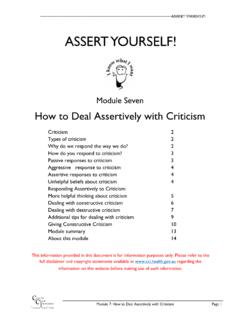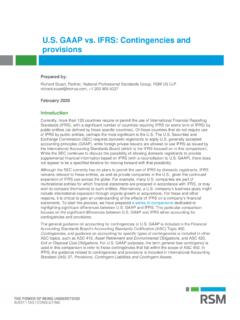Transcription of Mastering Conflict through Self- Awareness
1 University of Florida Mastering Conflict through self - Awareness self - Awareness is a crucial piece to Conflict management. In those moments when stakes are high, opinions differ and emotions are at full play, being aware of and knowing yourself can make the difference between resolution and escalation. People who are keenly Self- aware know how to recognize hot buttons in themselves and others and how to craft their messages in a Conflict to find that sweet spot between passive and aggressive and act assertively. Let s drop-in on a situation involving two colleagues who have opposing styles. Reid and Travis work with a research assistant named Lucas whose attention to detail has been slipping lately. Reid and Travis are concerned about the reliability of the information they are receiving and the impact on their research. Reid s approach focuses on pointing out all the mistakes that are being made in a belittling manner and bullying Lucas into going back and providing endless supportive data.
2 Travis is uncomfortable dealing with any type of Conflict , preferring to put in the extra time to check the information on his own even though this is frustrating and costing him valuable time that could be spent on his research. Neither approach is improving the situation or Lucas performance. Recently the Dean has observed the Conflict and is concerned about how the situation will be resolved. Her confidence and trust in Reid and Travis is diminishing. How Lack of self - Awareness Escalates Conflict Low self - Awareness often results in being driven by Self- defeating personal biases, prejudices, beliefs, assumptions and narratives most of which are unspoken and often unconscious. If you consider the iceberg analogy, others see what is above the surface: tension, silence, withdrawal, stress, exhaustion, anger, and disappointment. What they don t see is what is under the surface: fears, sadness, vulnerability, powerlessness, Self- doubt, and other beliefs that drive us to protect ourselves.
3 Reid has a tendency to approach Conflict in an actively destructive manner. What is visible to others about him in a Conflict situation, is that he enjoys winning at any cost, demeaning others, displaying bully behavior and using an aggressive tone and body language. His narrative might be: Lucas stupidity is dragging me down. If it weren t for him, I could already be published and the Dean would approve my pursuit of other research projects. I can t believe I have to work with such laggards. His fear might be: This incompetent kid s mistakes could cost me my career! Travis approach is also destructive: passively destructive. What others see during a Conflict is that he withdraws, becomes quiet and tense, and over-accommodating. If we could see below the surface, Travis feels very afraid of what might happen if Conflict erupts, believes Conflict never has a positive resolution, and because he values being seen as a good person, he fears that addressing Conflict means he is mean or disrespectful.
4 If we could eavesdrop on his story it might be: I m afraid I m going to lose my research funding if I don t get this right and work harder. I don t have the time to deal Why it matters? How leaders handle Conflict can make or break their careers. New research from Columbia University measured leader responses to Conflict and rated them on a spectrum. Those leaders who are too aggressive alienate peers, while those who passively avoid Conflict hinder their ability to reach their University of Florida with the Lucas issue and all the drama it will create. Besides someone needs to keep the peace in this department and stay in control and maybe he s just going through a difficult personal situation; it s a passing thing and I just have to buckle down until it gets better. It s my name first on any publication, after all. Using self - Awareness to Transform our Responses to Conflict Both Reid and Travis could benefit from understanding the emotions that live under the surface in this Conflict situation.
5 Knowing yourself requires regular, in-depth scrutiny of who you are and how you are in response to others. Self- mastery involves examining our counterproductive patterns of behavior and interactions with others especially heightened during a Conflict event. It s important to take a conscious look at why you need to behave in certain ways. In the example above, we see that the stories Reid and Travis are telling themselves about the Conflict are one of the factors influencing how they behave. Low self - Awareness often means that we underestimate the negative impact our words and actions have on others and ultimately our careers. We ignore the gap between what we mean to say and what others actually hear. This is the gap between intent and impact. Highly Self- aware people will reflect on these questions before pursuing a difficult conversation: What is the impression I want to make? How do I want people to feel about me at the end of this conversation?
6 How do I need to frame my message to reach that objective? How can I express myself in a way that doesn t damage our relationship? Understanding what is at stake is very important in deepening our self - Awareness . If Reid and Travis were aware that the Dean was observing (and hopefully communicating clear expectations directly to them) how their interactions could be career-limiting, both could decide to change their Conflict approaches. Additionally, if they were willing to understand the impact they were having on Lucas, or to see the situation through his point of view, they could transform what they believe is an obstacle into an opportunity to coach him so that everyone wins. Becoming intentional about increasing self - Awareness often requires changing the unconscious emotions below the surface which is reflected in new ways of thinking, being and acting. In turn, the way we communicate and interact with others improves.
7 Conflict is most often due to some underlying fears and our emotions surrounding those fears. This translates into productive or unproductive methods of communicating that minimize or escalate interpersonal Conflict . Self- aware people examine their interpersonal relationships on a regular basis and evaluate whether their communication methods positively or negatively impact the quality of those relationships. Ways to Increase self - Awareness and Conflict Competence People in Conflict can approach the situation competitively (or passively) or they can choose to seek cooperation, while honestly acknowledging the existence of the Conflict . Competition or passivity indicates there is a perception that one side wins and the other loses. Cooperation is about finding a solution both parties can be satisfied with. The first place to begin your self - Awareness journey is to determine which approach is your current default method. If it is competition or passivity, using some of the Self- reflection questions below can help you decide how to shift to cooperation.
8 Focusing on these questions in a mindful way helps increase self - Awareness . On a scale of 1 (low) to 10 (high) how would I rate myself on the following: (a) being a team-player; (b) my relationships with others; (c) how much I trust others; (d) the quality of my communication with others especially during Conflict ; and (e) my attitude towards my relationships? How aware am I of the feelings and emotions that operate below my iceberg? Can I list what they are? University of Florida Do I believe life is a zero-sum game and if others get theirs I won t get mine ? If so, why do I believe this? Has this belief brought you more or less Conflict in your workplace? Do my relationships manifest trust, dignity and respect? Am I harboring grudges or resentments from the past that become part of my story during a Conflict ? If so, why? Are there past experiences that might be influencing my approach to Conflict ? If so, why?
9 Do I have counterproductive habits and patterns that I am afraid to let go of? If yes, why? How would my workplace relationships be different if I approached Conflict another way? In addition to these reflective questions, there are other ways to seek feedback about how we manage Conflict and to use that information for development. Many of us have a trusted advisor, friend, colleague, or mentor that could provide us with honest information. Having the courage to ask is the first step. Listening without defensiveness is the next step. And, deciding how you might apply that information to changing your approach to Conflict is crucial. Many leaders make a brave decision to receive feedback using a 360-degree survey. This gives them multiple perspectives from those who interact with them frequently: direct reports, managers, and colleagues. The reports offer data points that help leaders maximize what they do well and specific constructive information for improvement.
10 It can also highlight if we are managing Conflict better or worse with certain groups of people. Am I better at Conflict management with my colleagues and worse with my manager and direct reports? In Summary Mastering Conflict requires emotional intelligence, skills, practice, seeking feedback and courage. But, as with most transformations, this journey begins with deeply understanding ourselves. This is the first of three articles on Conflict competence. In the next article, we'll provide ways for you to identify and manage your triggers, as well as strategies to enable perspective taking for positive Conflict resolutions. References Vajda, Peter. July 11, 2011. self - Awareness and Conflict . Retrieved from Portelance, Philip J. June 17, 2012. Conflict Resolution and self - Awareness . Retrieved from
